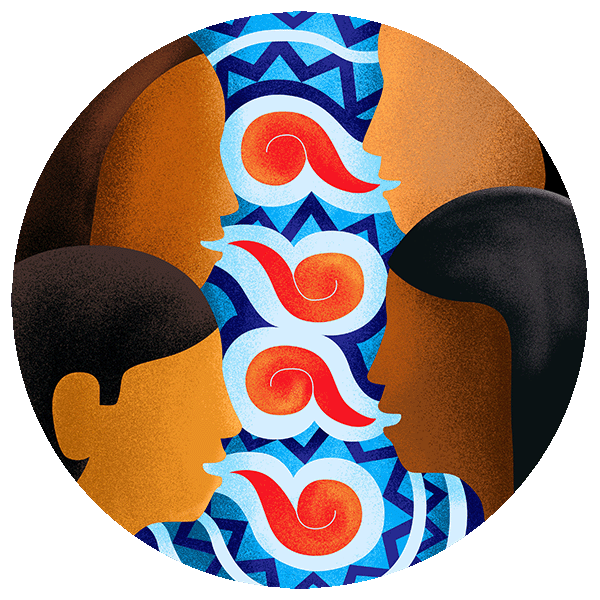
Language And Human Rights - An Interview By Bush Radio
In this radio program, Bush Radio 89.5 FM in Cape Town talks to Chris Nissen, The Human Rights Commissioner of South Africa on the importance of revitalizing Indigenous Languages.
Produced by Bush Radio
Interviewee: Chris Nissen
Samuel Nangiria On Indigenous Peoples And Development
The information and communications technologies have the potential to provide new solutions to development challenges, particularly in the context of globalization, and can foster economic growth, competitiveness, access to information and knowledge, poverty eradication, and social inclusion that will help to expedite the integration of all countries, especially developing countries, in particular the least developed countries, into the global economy.
International Day of The Worlds Indigenous Peoples - Leave No One Behind
There are over 476 million Indigenous Peoples living in 90 countries across the world, accounting for 6.2 percent of the global population. Indigenous Peoples are the holders of a vast diversity of unique cultures, traditions, languages, and knowledge systems. They have a special relationship with their lands and hold diverse concepts of development based on their own worldviews and priorities.
In this radio program, we hear from Nailejileji Tipap, who works as the Gender and Public Relations Coordinator at Pastoralists Indigenous NGOs Forum in Tanzania.
Rooibos Tea - South Africa's Indigenous Peoples Reclaim Their Birthright
Humanity NPC travelled to the home of Rooibos Tea in Wuperthal, South Africa, to talk to the Indigenous people there about the origins of the tea, and how it had been in their families for generations. This podcast also discusses the benefit sharing agreement, which promises that a benefit of the sales of the tea will go to the Indigenous Khoi and San people of the region and what it means to the people of Wuperthal.
Produced by Humanity NPC
Music by Collin Fredericks
Funded by OXFAM South Africa
Image by Tristen Taylor
Reclaiming What Belongs To Us - Khoi And San At Table Mountain
In October 2020, a group of people representing different Khoi and San Tribes gathered at the foot of Table Mountain in South Africa. There they have created a cultural space where they will stay for an indefinite period of time in an effort to reclaim the mountain. With the temporary huts providing a little shelter, and fire providing a little warmth, they are making it known that the mountain and the area surrounding it had once belonged to their ancestors. Bradley van Sitters is among the folks camped out at the foot of the mountain.
Facing the Storm - The Story of the Tanka Bar
Tanka bars are probably the most recognizable Native American food products in the U.S.. In this radio program, Dawn Sherman, CEO of Native American Natural Foods, takes us through the Tanka's history, past challenges, as well as present day aspirations.
Producer: Shaldon Ferris (Khoisan)
Interviewee: Dawn Sherman (Lakota, Shawnee, Delaware)
Music : "Saami Drum" by Tyler, used with permission
"Burn your village to the ground" by A Tribe called Red, used with permission.
The Lie Of 1652 - Eldos FM Interview With Patric Tariq Mellet
Patric Tariq Mellet is a heritage researcher whose search for his father roused his curiosity to find out who he was, and where he comes from. This journey has resulted in him becoming a subject matter expert on matters relating to the history of South Africa. In this interview, Diana Morat gets to know more about his book entitled, The Lie of 1652. Diana is a presenter at Eldos FM in Eldorado Park, Johannesburg, South Africa.
Cathy Fournier On Indigenous Identity And Health
Because of colonisation, many Indigenous Peoples face issues of discovering who they are, in terms of identity. Sometimes, this is as a result of education or religion.
Sometimes we question our own indigeneity, and perhaps, in some cases, there are reasons for this.
Each of us has a different past, a different coming together of events, that has led to who we are, and where we come from.
Cultural Survivals Avexnim Cojti spoke to Cathy Fournier, from the University of Torronto, in Canada.
Radio Promotes Diversity
Radio is a powerful medium for celebrating humanity in all its diversity. For Indigenous Peoples in many countries, radio is the most accessible platform to have their say in the languages that they speak and understand. Radio, therefore, is a fundamental means of communication for Indigenous Peoples to maintain their languages and to exercise and defend their rights. Moreover, radio is a means of ensuring the right to information in all sectors of society.
Indigenous South Africans To Benefit From Tea Industry
In South Africa, in November 2019, a small but significant victory has been achieved when a benefit sharing agreement was reached with the Indigenous People of South Africa. The Khoi and San people will now benefit from the multi-million rand Rooibos tea and Honeybush industries.
Only 2% of the farmers who grow the tea are from Indigenous communities.
National KhoiSan Council chairman Cecil LeFleur talks to Indigenous Rights Radio.
Producer: Shaldon Ferris
Image: Tea
Music: Yarina, Lights in the Forrest, used with permission.
